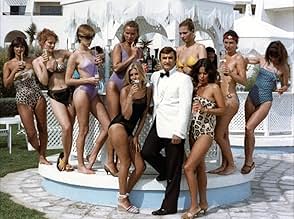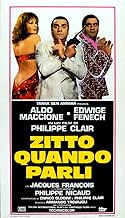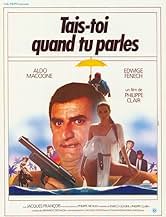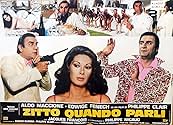VALUTAZIONE IMDb
4,3/10
149
LA TUA VALUTAZIONE
Un sognatore viene scambiato per una vera spia e spedito in Tunisia dove deve compiere una vera missione.Un sognatore viene scambiato per una vera spia e spedito in Tunisia dove deve compiere una vera missione.Un sognatore viene scambiato per una vera spia e spedito in Tunisia dove deve compiere una vera missione.
Trama
Lo sapevi?
- QuizItalian censorship visa # 77635 delivered on 26-3-1982.
- BlooperWhen 'James' is escorted off the tennis field, the umbrella that his servant is carrying changes from the right to the left hand between cuts.
- ConnessioniReferenced in Il predatore invisibile (1983)
Recensione in evidenza
Before analysing anything, let's admit this: James Bond is popular, as popular as it gets. He's a hero that has transformed in order to correspond to the needs of different times, from a charming womaniser who always wins, to a vulnerable, yet still dominant character. This popularity has produced a lot of by-products, by this I mean parodies, from the Johnny English film series with Rowan Atkinson, to the 1975 comedy "Bons baisers de Hong Kong", starring then-popular pop group Les Charlots. Italian charmer Aldo Maccione also tried his hand at Bond-parody with "Tais-toi quand tu parles!", a film that starts off well, but progresses unsuccessfully.
Maccione's character in this movie reminded me of his one in "Le bourreau des coeurs", a film he shot two years later. This just shows how formulaic his comedies were. In "Tais-toi quand tu parles !", he plays Giacomo, an Italian fan of James Bond that dreams of being the famous agent, but in real life is constantly phoned by his mother to see if he's well, and has no job because of his clumsiness. All this until an apparently idiotic team of spies mistakes him for James Bond and sends him to Tunisia with the orders to carry out a mission.
To be fair to the film, I expected even less due to both the low quality of previous Maccione movies I had seen and the fact that it was directed by Philippe Clair. I wouldn't exactly call him a good director, since both "Tais-toi quand tu parles", and another film of his, Les Charlots' first movie "La grande java" (1970) are deficient in humorous scenes.
When I write this, don't mistake me. I appreciate gag-filled films. I just like the gags to be at least either so exaggerated to be hilarious or smart enough to cause laughs. Clair should have just left the film in Maccione's dream universe, and not make it a real-life adventure, since the contradiction between the hero's imaginary self and his real one was more successful that his antics as a poor man's James Bond.
Speaking of the hero, Aldo Maccione's acting was arguably his best between the three movies in which I have seen him play. His classic Italian emotional intensity found good use in his portrayal of the obsessive fan of James Bond, and it was him that made the movie a partially successful comedy. Unfortunately, the promising start of the film, where he dreams of being in a beach and just seducing everyone - a scene that wouldn't easily pass by today's standards - until being woken up by falling from his bed, is followed by his adventures in Tunisia, that make the film drag on and on without almost changing at all.
The general attitude of the film could easily be summed up by its title, which is actually meaningless both in French and English; uttered by Maccione to one of his Tunisian helpers, it can be translated as "Shut up when you talk". The poor man responds that this is not proper French, but Maccione ignores him, since he is determined to carry his James Bond adventures up to their indifferent conclusion.
Indifferent could also be a suitable word with which to describe the film's music. Composer Armando Trovajoli came up with a very pleasing theme, that can be heard at the title sequence when the movie begins. It is, however, succeeded by a score that made no particular impression on me, generic, and honestly, just dull due to its repetitiveness.
All in all, "Tais-toi quand tu parles !", was a lost opportunity for Aldo Maccione to make a hilarious comedy of contradictions that ended up as just another gag-ridden spy parody. Maybe Philippe Clair should have been told the memorable Maccione saying: Dear Mr. Clair, Tais-toi quand tu parles !
Maccione's character in this movie reminded me of his one in "Le bourreau des coeurs", a film he shot two years later. This just shows how formulaic his comedies were. In "Tais-toi quand tu parles !", he plays Giacomo, an Italian fan of James Bond that dreams of being the famous agent, but in real life is constantly phoned by his mother to see if he's well, and has no job because of his clumsiness. All this until an apparently idiotic team of spies mistakes him for James Bond and sends him to Tunisia with the orders to carry out a mission.
To be fair to the film, I expected even less due to both the low quality of previous Maccione movies I had seen and the fact that it was directed by Philippe Clair. I wouldn't exactly call him a good director, since both "Tais-toi quand tu parles", and another film of his, Les Charlots' first movie "La grande java" (1970) are deficient in humorous scenes.
When I write this, don't mistake me. I appreciate gag-filled films. I just like the gags to be at least either so exaggerated to be hilarious or smart enough to cause laughs. Clair should have just left the film in Maccione's dream universe, and not make it a real-life adventure, since the contradiction between the hero's imaginary self and his real one was more successful that his antics as a poor man's James Bond.
Speaking of the hero, Aldo Maccione's acting was arguably his best between the three movies in which I have seen him play. His classic Italian emotional intensity found good use in his portrayal of the obsessive fan of James Bond, and it was him that made the movie a partially successful comedy. Unfortunately, the promising start of the film, where he dreams of being in a beach and just seducing everyone - a scene that wouldn't easily pass by today's standards - until being woken up by falling from his bed, is followed by his adventures in Tunisia, that make the film drag on and on without almost changing at all.
The general attitude of the film could easily be summed up by its title, which is actually meaningless both in French and English; uttered by Maccione to one of his Tunisian helpers, it can be translated as "Shut up when you talk". The poor man responds that this is not proper French, but Maccione ignores him, since he is determined to carry his James Bond adventures up to their indifferent conclusion.
Indifferent could also be a suitable word with which to describe the film's music. Composer Armando Trovajoli came up with a very pleasing theme, that can be heard at the title sequence when the movie begins. It is, however, succeeded by a score that made no particular impression on me, generic, and honestly, just dull due to its repetitiveness.
All in all, "Tais-toi quand tu parles !", was a lost opportunity for Aldo Maccione to make a hilarious comedy of contradictions that ended up as just another gag-ridden spy parody. Maybe Philippe Clair should have been told the memorable Maccione saying: Dear Mr. Clair, Tais-toi quand tu parles !
- eightylicious
- 11 mar 2022
- Permalink
I più visti
Accedi per valutare e creare un elenco di titoli salvati per ottenere consigli personalizzati
Dettagli
Contribuisci a questa pagina
Suggerisci una modifica o aggiungi i contenuti mancanti

Divario superiore
By what name was Zitto quando parli (1981) officially released in Canada in English?
Rispondi





















